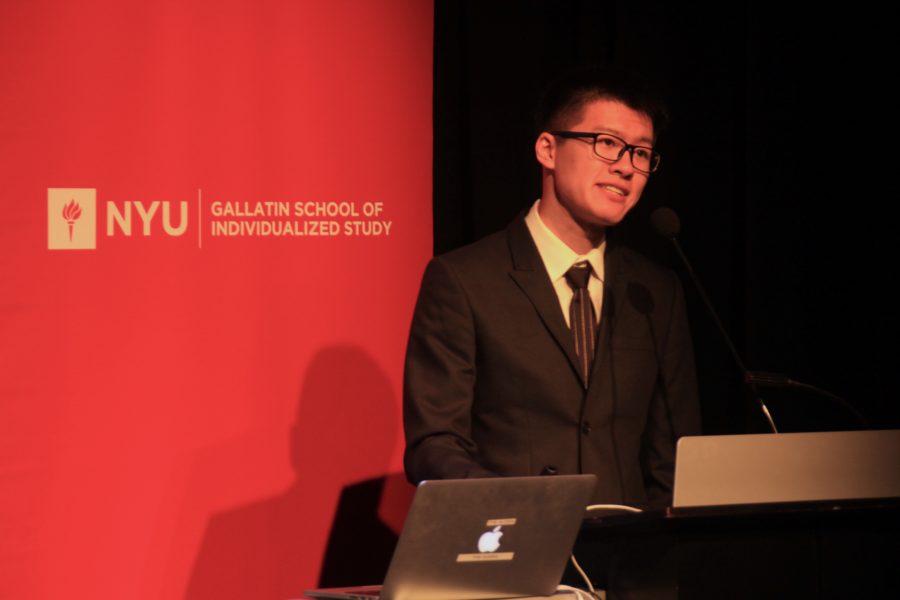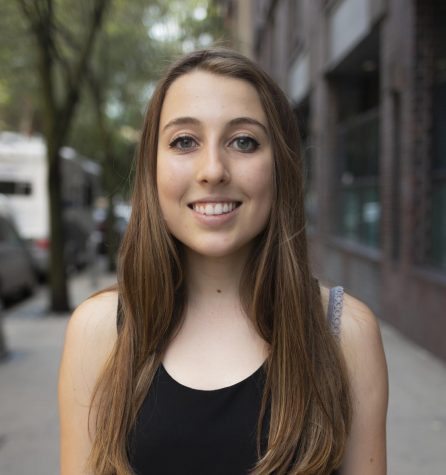NYU Wagner Student Works Undercover in iPhone Factory
During the summer, Dejian Zeng worked undercover in a factory in China that produces Apple products. This experience helped him build his knowledge and passion for activism.
April 12, 2017
Dejian Zeng, a student from China who studies at the Wagner Graduate School of Public Service, spent six weeks of last summer working undercover in a factory in China that produces iPhones for Apple.
Zeng is studying nonprofit management and public policy with an international specialization. Zeng said that the idea to work undercover arose when he was awarded an NYU Gallatin human rights fellowship, which required him to complete an internship during the summer in a non-profit field. He decided to work for China Labor Watch — a non-profit organization that aims to increase transparency of factory labor conditions and supply chains, and advocates for the rights of workers.
While working at the factory, Zeng slept in a dorm room with seven other people. Although he was already working upwards of 60 hours a week in the factory, Zeng said that if the manager told workers that they were required to stay overtime, they were not allowed to refuse. Zeng also said that he was not working during the busiest season, and some of his friends who are still working at the factory are working on Sundays in addition to the 60 hours they already work. He questioned the legality of this situation.
In an interview with Washington Square News, Zeng discussed how his interest in activism led him to this experience, his time working inside the factory and the conditions endured by workers in similar facilities.
Washington Square News: How did you end up working in the Apple factory in China?
Dejian Zeng: I reached out to this non-profit called China Labor Watch and then we were thinking about what I should do for the summer — I insisted that I wanted to go to China and do some field work. [China Labor Watch] said that the work they do in China is send an undercover investigator into the factories and write a report on it, and then do international advocacy. So we decided that I would go undercover in a factory. At that point they had a few factories under investigation — we spotted this Apple factory in Shanghai because at that point the factory [had] cut the benefits of workers. They raised the base salary but overall the workers were getting less. We thought there might be strikes and that’s why I went to the factories to observe the strike and how it would happen, but in the end the strike didn’t happen. However, I did learn a lot about workers’ life in the factories — how do they feel, what do they think.
WSN: What were your thoughts before you went to the factory for the first time?
DJ: The feeling is very complicated. First of all, you will feel that the situation is not as bad as you think because when you look at the facilities, dorms and all the things they provided, it looks pretty good. The campus is pretty clean and they have basketball courts. But later on when you really get into the work, you realize that it is just tiring. The positive thing is that I got to learn about the workers which surprised me. The most shocking things that I found in the factory were the workers themselves, because we have a lot of imagination and stereotypes thinking about how workers should be, but actually they are very capable people. Some of them do a lot of things just like you and me will do — they follow news and talk about celebrities and movies.
WSN: What was your specific job in the factory?
DJ: What I [did was] just fasten one screw. My station is called fasten speakers to housing. Housing is the back case of the iPhone and the speaker is the speaker, and what I do is put the speaker on housing and put a screw on it. I just keep doing that for the whole day. In one day we produce about 3,600 iPhones, but my station was two people so I personally would screw 1,800 in one day when I was in the factory. It gets very boring. At the beginning you don’t have any time to think of other things because you are thinking about the procedures — at the beginning time flies. But after a while you get bored because you know how it works and get so familiar with it. I could do the work closing my eyes, when I felt sleepy.
WSN: How did this experience affect your life and studies at NYU?
DJ: I value the life that I have now so much because I know that I am really privileged compared to those people. I get much more happiness from my life because when you see the other side, it is different. The second difference is that I am trying to do more advocacy for the workers — some of them are still my friends in the factory and I want some changes on the ground for them in the practices of the factories like better benefits and less angry managers. The third thing I would say to the general Apple user is that I personally don’t think we should boycott Apple after that experience. I don’t think it’s realistic because they are still good electronic devices and people will still buy them. For us as customers, we should talk more about it and campaign over social media. We should just be aware and think of the workers behind this phone.
WSN: What advice do you have for any students considering an experience similar to this one?
DJ: I would say don’t think it’s too hard because now you can look at my experience, which is so crazy, but when it is really happening it is not that hard. Just go and do it. What China Labor Watch told me is just that they don’t have people send me and carry me there, they just told me the address of the factory and I just did it. When you really want to do something you just do it. If you want to do field work, book a flight and interview people. It doesn’t matter how good or how bad you do it, the experience will make it rewarding.
Email Jemima McEvoy at [email protected].



























































































































































